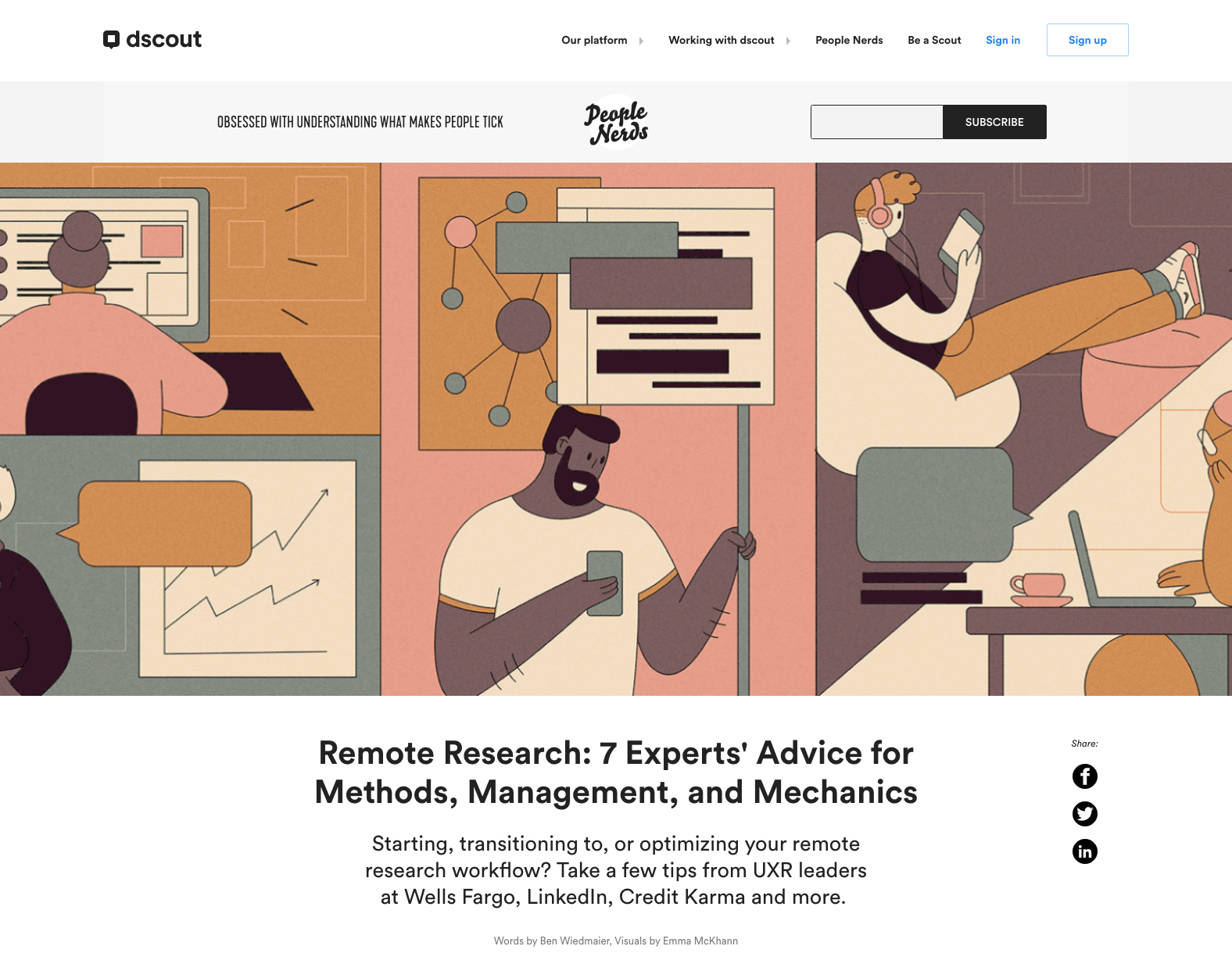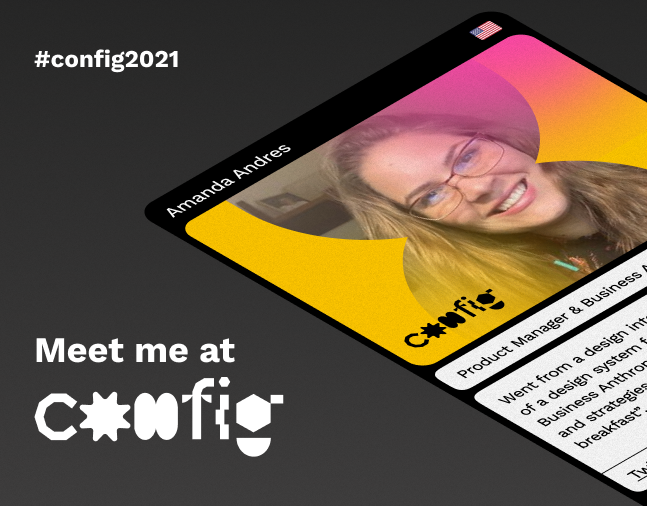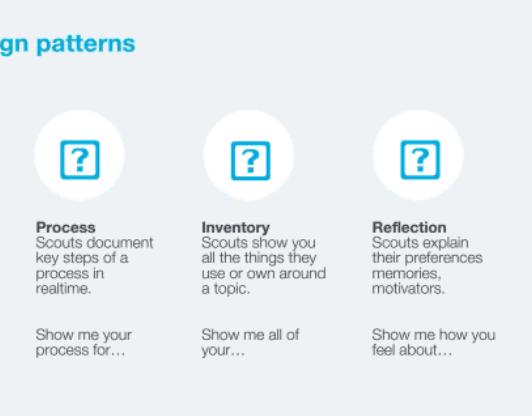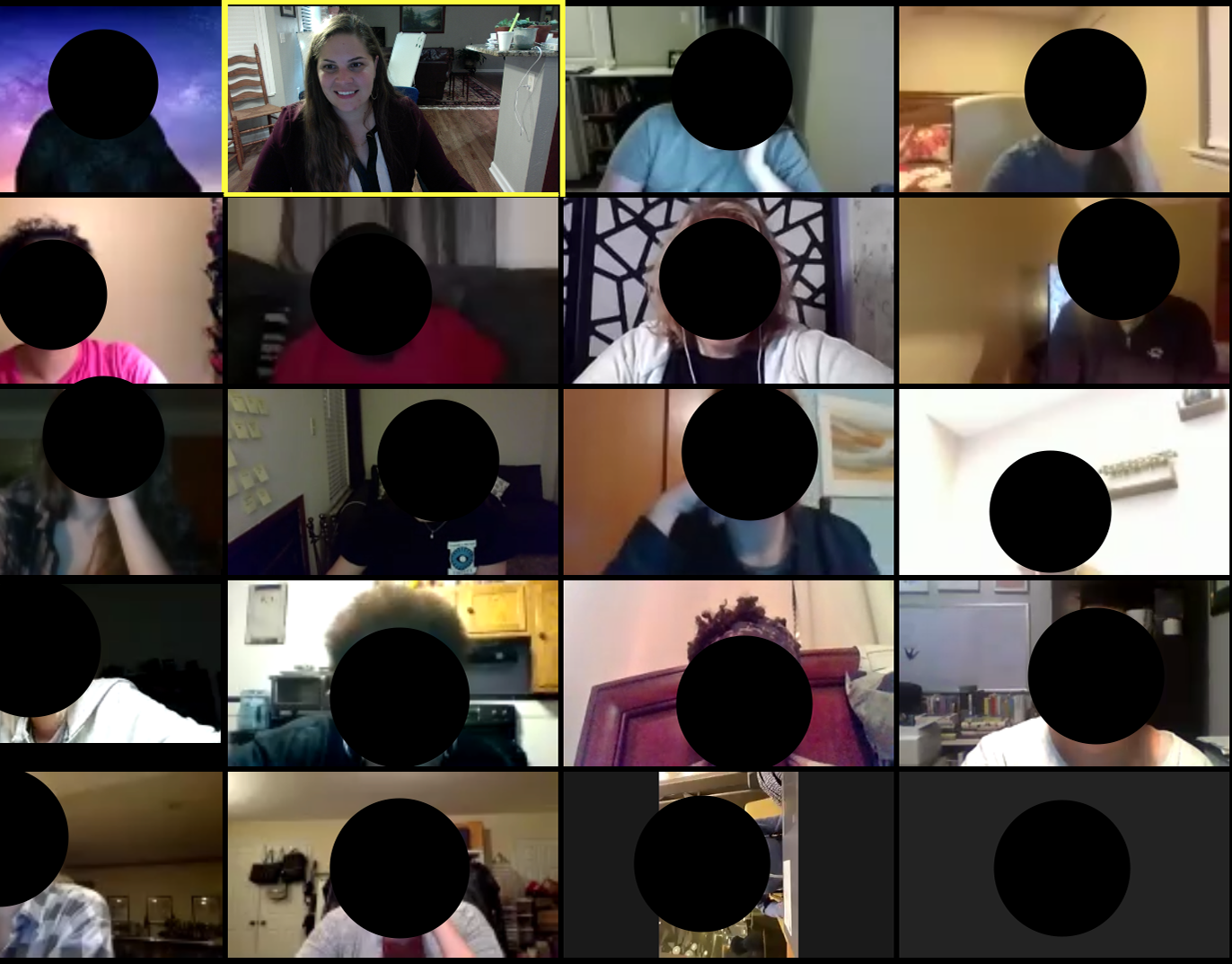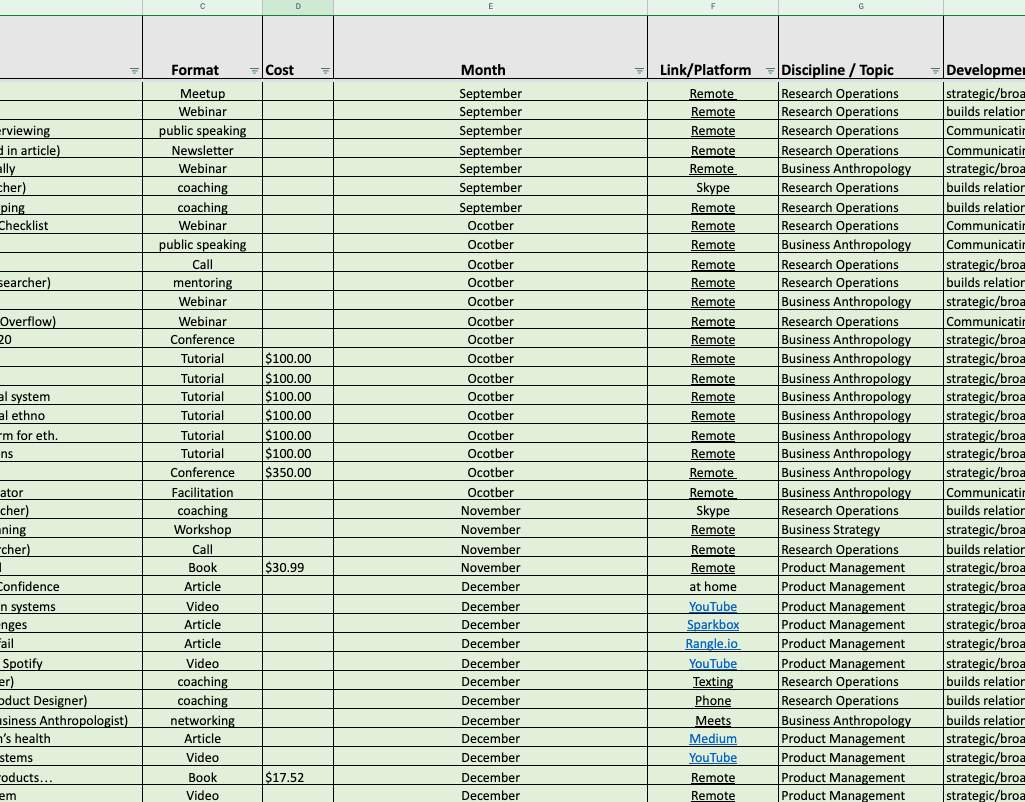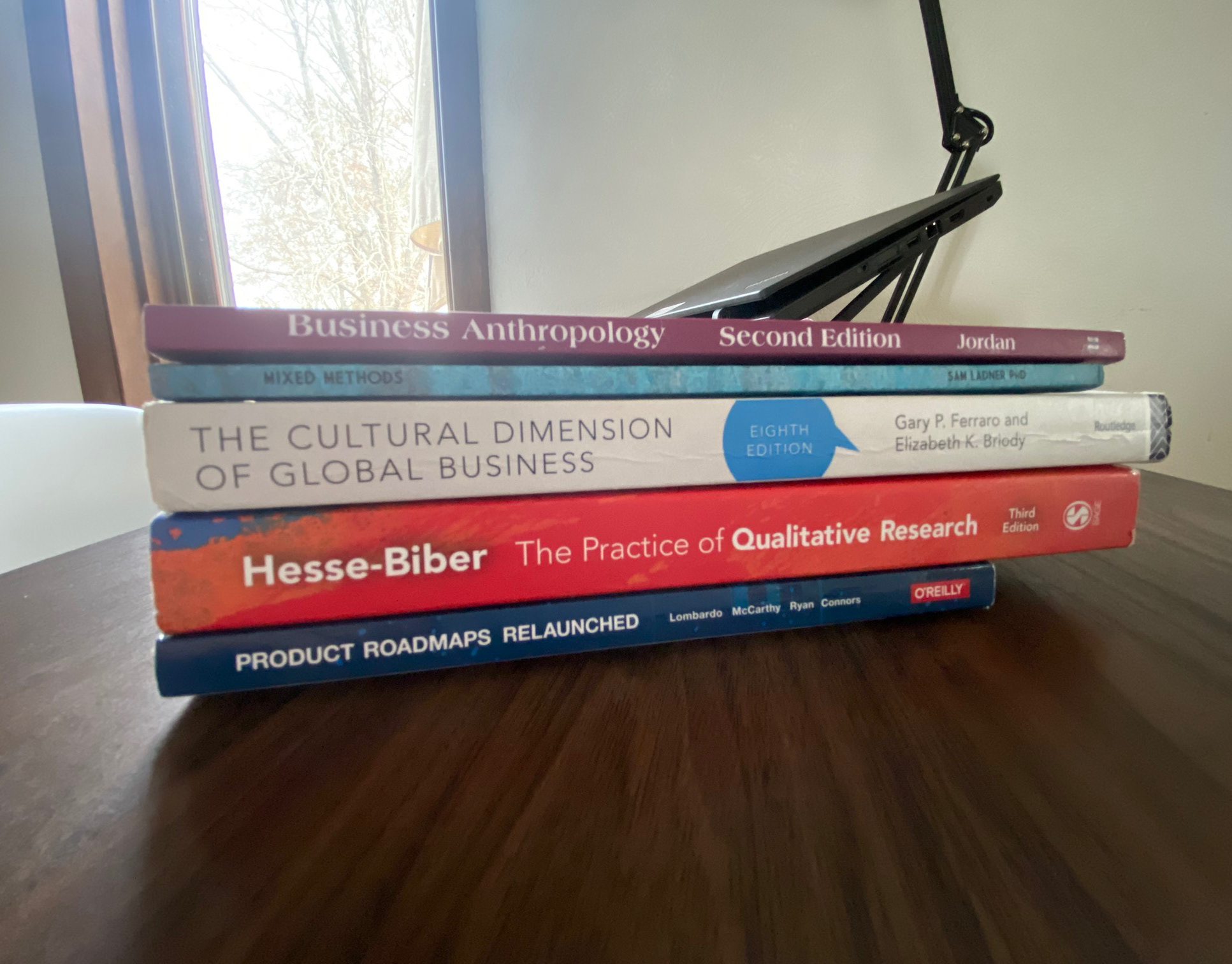A selfie of me right before the second cohort session started
The opening slide for the first EPIC 2020 cohort session.
Four years ago, I jumped into the deep end of the ethnographic research pool. Since then I've clung to my life preserver, EPIC, to learn to swim in the countless theoretical frameworks and research methods necessary to make an impact in the corporate world.
Besides attending the many talks and classes offered throughout the year, the icing on the cake is the annual EPIC Conference. I've made an effort to attend each conference either in-person or virtually (when funds are sparse).
This year, the Melbourne location for EPIC 2020 was impossible due to the pandemic. I was bummed initially but then pleased to hear that the conference coordinators were branching out digitally and planning to host the entire conference virtually. Talk about an innovative spirit and determination!
Let me share a little about this unique experience through the pictures and text blurbs below.
Each participant was given their own customized EPIC 2020 Conference Schedule. Here is a look at the numerous activities I attended over ten days. Talk about luxuriating in research conversations and content!
New formats for interacting
EPIC rolled out a digital experience I've never seen before. I geeked out every day over the agenda UI and the conversation capabilities!
Because the conference was global, they created three regions. The region I was grouped into was named Parkes. It covered North and South America. Over ten days, we had the opportunity to connect with people in our region AND all over the world through cross-region events.
Parkes Cohort Facilitator
I was thrilled when EPIC invited me to be a Parkes cohort facilitator. I did one of those high pitched girl screams when I read the email. I was ecstatic about the opportunity to help out and be a host! The thought of hosting a group of people for an hour brought me back to the amazing coffee break chats you find only at the in-person EPIC conferences.
Nicole Carelock and Rita Denny, members of the EPIC board, did a fantastic job this year in helping to coordinate the cohorts. Rita shared, "Cohorts are a happy mix of fun exploration (through connecting-with-new-people) and thoughtful exchange (discussion topics linked to conference content). Nothing else in the conference can quite do this, so your role is hugely important."
After attending a virtual session to learn more about being a cohort facilitator, it was clear that Nicole Carelock outdid herself with the cohort planning! Not only did Nicole reflect and design the activities, but she also created the content and presentation materials the faciltators would be using. Here is a breakdown of the format:
Rapid Roulette: A high-speed, iterative activity with fun prompts that participants use to get to know each other. You will explain the activity and use the Breakout Rooms feature of Zoom to move people in and out of pair groups every few minutes.
Discussion: We'll process what we've been hearing at the conference and apply it to our own work contexts. Topics and discussion questions will be provided for you. You will explain the activity to your cohort participants, and use Breakout Rooms.
Assign Homework: Don't worry, it couldn't be easier! These are questions to inform the next cohort. These notes prompt people to reflect and share, and will be a basis for discussion at the next Cohort session
A week later, one of my fellow Parkes cohort facilitators, Shelley O'Neil, adapted the cohort launching guide for herself and then shared it with us, in case we wanted to use it. Her enhancements were a touch of beauty, so I was glad to use her enhanced slides (pictured below).
What is my cohort slide.
The hour together slide.
Session 1 (Sunday, 25 October)
I was looking forward to the experience of the cohorts. This was my very first time serving as a EPIC host, so I had a swarm of butterflies in my stomach. Luckily, the nine cohort members enjoyed the breakout activities and group conversation.
We started with two rounds of rapid roulette in three breakout rooms, where people shared where they were located and what being from there has taught them. We had members coming from all across the United States, including Washington, Oregon, California, Illinois, and New York.
Then everyone transitioned back to the main room for a group discussion on how data and AI effects our current work. Our group of nine agreed that cross-disciplinary partnership and collaboration around a shared goal is critical for triangulation. One cohort member shared a success story of how an engineer who observed the fieldwork had later used the researchers work to make a point in their own presentation. One of the group takeaways is that this signal, a researchers work being implemented into the engineering work, can serve as a milestone in our own practices.
Session 2 (Monday, 26 October)
I went from nine people in my first session to twelve in my second session.
We started with two rounds of rapid roulette in three breakout rooms to share an object people had within reach and what that story that object told about us.
We started with two rounds of rapid roulette in three breakout rooms to share an object people had within reach and what that story that object told about us.
Once everyone had met a few new people, they transitioned to the main room for a group discussion on conflicting stakeholder objectives and research findings as a group. We had a range of thoughts shared. A few speakers were able to plug their upcoming Tuesday sessions as the groups discussion touched on their topics.
The group wrapped up by sharing what we they hearing from the conference session.
Session 3 (Tuesday, 27 October)
I had seven people in my third, and final, session. We did one last round of rapid roulette in two breakout rooms and then came together to talk about working and living in a period of enforced distancing and isolation.
Cohort members shared how their work lives have shifted, how their home lives have shifted. One member has found tremendous success coaching people as they are changing careers (many who are transitioning from academia to industry).
We ended the last cohort by reminding everyone to connect on LinkedIn after the conference if they had not already done so.
Before I wrap up, I'll let you in on the secret.
EPIC Conferences are a vacation. Imagine leaving your current business constraints and research-to-business translator behind for a week and luxuriating in conversations with hundreds of people who speak the same language, use the same methods, experience the same hurdles, and love to travel and explore new cities as much as you do! Even though the 570+ EPIC 2020 Conference attendees were unable to explore Melbourne, we were able to share our virtual homes, objects, and city streets with each other through these unique cohorts. I am glad to have attended and met such wonderful people.
Wrapping up.
On Wednesday's final goodbye session for the conference, one of my Parkes cohort members thanked the cohort facilitators in the group chat and also made a call out that I was a great facilitator. My heart filled with a deep pride in that moment as I read those words. I put this down in writing because it is critical for people to know this; if you are scared of taking on a facilitator role, know the fear will go away. It may take time to go away, but it's worth it. Put yourself out there and grow!
Thank you, EPIC.
Finally, I want to extend a very warm thank you, EPIC, for this opportunity of serving people through this cohort facilitator role! I thoroughly enjoyed this experience and look forward to contributing to the EPIC community in the future.

